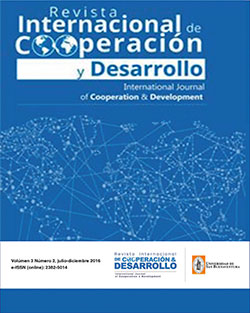INTERNATIONAL JOURNAL OF COOPERATION AND DEVELOPMENT
Assignment of Rights
Authorization for reproduction, publication, communication and distribution of a literary, artistic or scientific
Work.
I , ____________________________________________, author of the book and / or article , of legal age , resident of the city of _________________ , identified with citizenship / passport n° ______________________ issued on _______________________, in exercise of his physical and mental faculties , part henceforth be called the AUTHOR , supports the following authorization to the reproduction, publication, communication and distribution of a work, perform the following terms:
1. Regardless of current legal regulations due to the linking of the parties to this contract, and any kind of legal presumption , the parties agree that the AUTHOR authorize ( name of the publisher ) to reproduce , publish , communicate and distribute the material referred to in the International Journal of Cooperation and Development of the University of San Buenaventura.
2. Such authorization lies in particular on the copyright of the work, by any means known or unknown, publication of the work, distribution of the work , either directly or through third parties for purely educational purposes.
3. AUTHOR agrees to report and declare the existence of this authorization and to preserve the right of the International Journal of Cooperation and Development of the first publication of the work.
4. AUTHOR declares that the article is original and that it is his sole creation, no impediment of any kind exist for the authorization he is doing, besides being responsible for any action claim, plagiarism or other type of claim that might arise about .
5. Such permission is free of charge.
6. Moral copyright in the article are solely the AUTHOR and the University of San Buenaventura expressly agrees to recognize and respect them rigorously.
The Author and / or AUTHORS
SIGNATURE
Abstract
The sixteenth goal of the United Nations’ seventeen sustainable development goals (SDGs) seeks to promote peaceful and inclusive societies for sustainable development. Therefore including the reduction of all forms of violence and violence-related deaths, the reduction of illicit arms and capital flow, the recovery and return of stolen property, and the fight against all forms of organized crime among others. Understanding the effects of conflicts clarifies the linkage and interdependence of the peace agenda and the realization of the majority of the SDGs. Kenya, which is a party to the resolutions of the General Assembly of the United Nations, has in its history experienced episodes of inter-community conflicts arising from competition for control of scarce natural resources among pastoral communities, election related violence, and clashes arising from land boundary disputes. On the basis of the experiences of ethnic conflicts during election periods and literature review, this paper discusses the economic effects of inter-community conflicts in Kenya and points out how such effects make peace building and conflict resolution critical to the achievement of other SDGs.
References
Report 2008/2009
Ayittey, G. B. N (1999) Economic Impact of Africa’s
Conflicts. Paper presented at the 8th Annual African Studies Coalition Conference, University of California, Sacramento, CA. May 2-5
Department for International Development (2001) The causes of conflict in Africa. Consultation document.
Hoeffler, A (2008) Dealing with the Consequences of Violent Conflicts in Africa. Background Paper for the African Development Bank Report
2008
Huho J, M (2012) Conflict Resolution among Pastoral Communities in West Pokot County, Kenya: A Missing Link. Academic Research
International Vol. 3 (3)
Human Rights Watch (2016) “I just sit and wait to die”. Reparations for Survivors of Kenya’s 2007 - 2008 Post - Election Violence. A report
by the Human Rights Watch Organization Nyukuri B. K (1997) The Impact of Past And Potential Ethnic Conflicts on Kenyan’s Stability
and Development. A paper prepared for the USAID Conference on Conflict resolution in the Greater Horn of Africa June.
Odhiambo, M.O (2012) Impact of Conflict on Pastoral Communities’ Resilience in the Horn of Africa: Case Studies from Ethiopia, Kenya
and Uganda. RECONCILE/FAO Report Opiyo, F. E.O, O. V. Wasonga, J. Schilling and S.
M. Mureithi (2012) Resource-based conflicts in drought-prone Northwestern Kenya: The drivers and mitigation mechanisms. Wudpecker Journal of Agricultural Research Vol. 1(11), pp. 442 – 453
Ong’ayo, A, O (2008) The Post -election Violence in Kenya: Overview of the Underlying issues. Pambazuka News on 14th February 2008
Republic of Kenya (1972) Economic Survey. Nairobi. Government Printer
Republic of Kenya (1978) Economic Survey. Nairobi. Government Printer
Republic of Kenya (1983) Economic Survey. Nairobi. Government Printer
Republic of Kenya (1984) Economic Survey. Nairobi. Government Printer
Republic of Kenya (1987) Economic Survey. Nairobi. Government Printer
Republic of Kenya (1990) Economic Survey. Nairobi. Government Printer
Republic of Kenya (1994) Economic Survey. Nairobi. Government Printer
Republic of Kenya (1999) Economic Survey. Nairobi. Government Printer
Republic of Kenya (2003) Economic Survey. Nairobi. Government Printer
Republic of Kenya (2005) Economic Survey. Nairobi. Government Printer
Republic of Kenya (2008) Economic Survey. Nairobi. Government Printer
Republic of Kenya (2010) Economic Survey. Nairobi. Government Printer
Republic of Kenya (2014) Economic Survey. Nairobi. Government Printer
Ruto P, A. Mohamud and I. Masinde (2003) Conflict in Northern Kenya: A Focus on the Internally Displaced Conflict Victims in Northern Kenya. ITDG-EA Publication
Schilling, J, F. E. Opiyo, and J. Scheffran (2012) Raiding pastoral livelihoods: Motives and effects of violent conflict in north-western Kenya.
Springer International Publishing Ltd Serneels, P and M. Verpoorten (2012) The impact of armed conflict on economic performance
Evidence from Rwanda. Center for the study of African Economies (CSAE) working Paper
United Nations (2015) Transforming Our World: The 2030 Agenda for Sustainable Development.
Resolution adopted by the General Assembly on 25 September 2015















